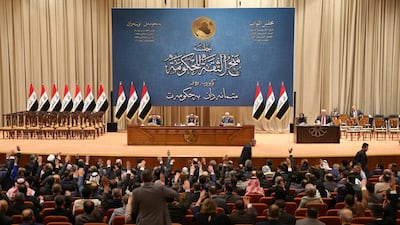Iraqi politicians on Monday rejected a draft budget bill for 2019 because they say it does not allocate funds for the reconstruction of areas liberated from ISIS.
The budget of $111.9 billion is based on projected oil exports of 3.8 million barrels per day at a price of $56 per barrel.
Jaber Al Jaberi, an MP representing Anbar , said the amount allocated for his province is meant to cover public sector salaries and public services but not rebuilding after the three-year-long war against the militant group.
"There is no budget allocation for the reconstruction of liberated areas such as Anbar province, which is estimated to cost one hundred billion dollars," Mr Al Jaberi told The National.
"People are demanding adequate services. There are no schools or hospitals. The province's infrastructure is severely damaged," he said, adding that the allocation for Anbar was less than one per cent of the budget.
Prime Minister Adel Abdul Mahdi approved the draft budget in October, which now awaits parliament's approval. The bill envisions an increase in spending of $24bn and a deficit of $22.6bn for 2019.
Parliament is expected to convene on Tuesday to discuss the budget, the formation of parliamentary committees and the process of government formation.
Osama Al Nujaifi, a former vice president, threatened to approach the federal court if the share of Nineveh's province, in northern Iraq, was not adjusted to accommodate reconstruction efforts.
Mr Al Nujaifi said that the war against ISIS in Nineveh - the second-most populated province in Iraq - had left the region’s cities in ruin. Experts estimate that the reconstruction of the provincial capital alone will cost billions of dollars.
The government estimates that rebuilding Iraq and repairing damaged homes after three years of war with ISIS will cost more than $88bn.
About $23bn will be needed in the short term and more than $65bn in the medium term, the director general of Iraq’s planning ministry, Qusay Adulfattah, said.
_______________
Read more:
First hotel to open in Anbar a poser for tribal traditions in Iraq
Iraq opens investigation into thousands of dead carp in Euphrates river
Money moves again in Iraq's Mosul, but not via banks
_______________
Kurdish politicians have also rejected the 2019 draft budget because their share was dropped from 17 per cent in 2018 to 12.67 per cent, according to Fazil Nabi, a former deputy minister of finance in Baghdad.
Experts say that the disparity between provinces in the 2019 budget allocations, with Nineveh and other Sunni-majority areas getting much less per capita, will pose a major obstacle in government in the months ahead.
Kirk Sowell, an Iraq expert with Utica Risk Services, said that previous budget allocations had been based on population estimates. In the absence of an official census, these estimates were drawn from food ration figures, on the assumption that the need for food aid was roughly proportional throughout the country post-2003, he said.
"The problem this time is that there are very large disparities between provinces in how much they get in capital spending, with Shia-majority provinces getting a lot more, Nineveh and Anbar getting very little," Mr Sowell said.
Defenders of the government say the discrepancy will be resolved through extra-budgetary spending in Sunni-majority provinces by the Finance Ministry. However, according to Mr Sowell, there is no guarantee that funds will be available.
_________
Read more:
Iraqi PM designate says reconstruction top of his agenda
Iraq PM designate Adel Abdul Mahdi met with cautious optimism
Iraq offers citizens opportunity to apply online for cabinet positions
_________

